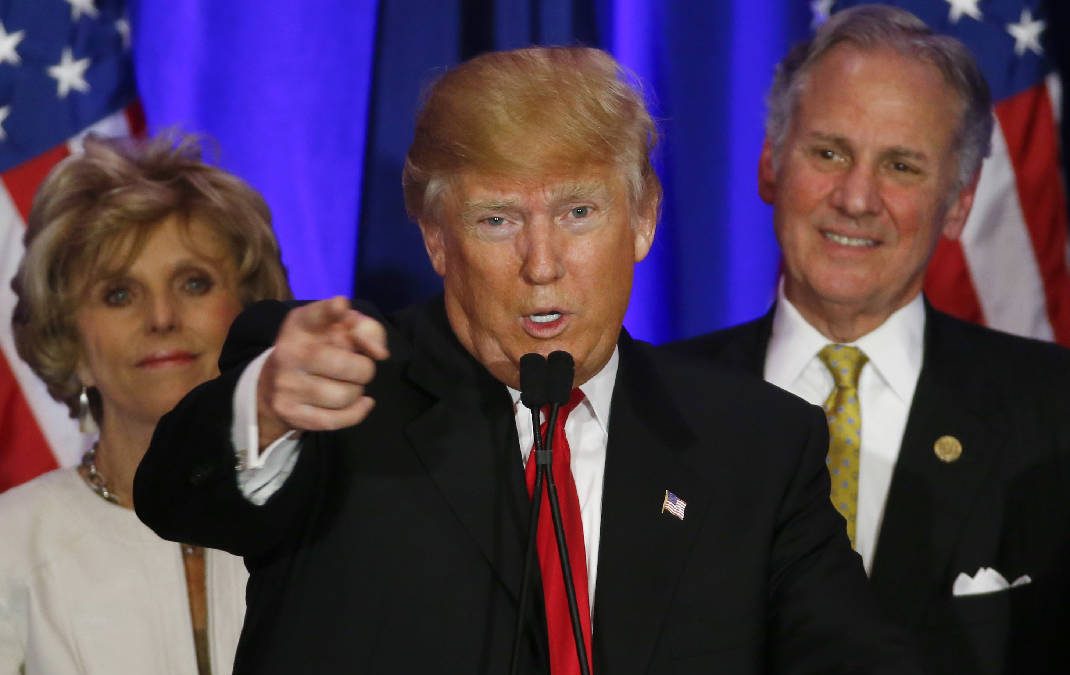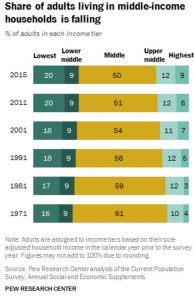From the get go the pundits have been puzzled by this year’s Presidential primaries season. The confusion goes back to last June when Donald Trump announced his candidacy for the office of President. At first, the predictions were that Trump’s candidacy was a self-limited process of narcissistic personal promotion. On the Democratic side, the word was that Hillary Clinton was a “shoo-in” this time around and would not be challenged by some upstart campaign like the one Barack Obama waged against her in 2008.
Now at a time of the year when we are usually talking about “March Madness”, we are getting our suspense and thrills by watching a different game that is being played for higher stakes. Political debates are drawing huge audiences that are looking for the excitement and surprises from the sudden-death realities of the intense competition that will have a much longer lasting significance than college basketball’s final weeks. I have read more conflicting analysis about what might happen on March 15 and the weeks that follow than we usually see as basketball moves from the “sweet sixteen” to the final four. As the intensity builds, the pundits are scrambling for explanations about why they were so wrong. In many opinion columns I read, the writer is in a process of self flagellation for discounting Trump’s potential. If they have any energy left over they are trying to explain how those people who are “feeling the Bern” are similar to or different from those who are voting to “Make America Great Again”.
Perhaps chief among the confused and back-peddling pundits is Nicholas Kristof, a liberal columnist at the New York Times, who has announced via an imaginary conversation with a “voter” that we should begin getting used to the phrase “President Trump”.
Voter: In the past, Trump was an entertainment personality, so he said outrageous things. From now on, he’ll be more presidential and more moderate, reaching out to Democrats — which he can do better than Cruz or Rubio, because he’s not so conservative. And for all your naysaying, he’ll be elected president, and he’ll show that all your anxieties are as imaginary as I am. Get used to the phrase: President Trump.
That sounds like the game is over, but wait! A former player charges on to the court and attempts to draw up a play that the Republican team can try that just might save the day and delay what may be an inevitable victory for the much-despised garish champion of self promotion. The guy who lost the last tournament, Mitt Romney, gave a brilliantly constructed and magnificently delivered speech that was a point by point validation of the reasons to fight on for those Republicans who fear a future with Donald Trump as their party’s nominee for President. This speech would have really scored in 2012 but this year the ball seems to have just clanked off the backboard and rim and it is unlikely that anyone who was supporting Trump before will say to Mr. Romney, “Thanks Mitt, I have no idea why I was voting for Trump. With your advice I will drop that silly idea and try to find a respectable establishment candidate that deserves my vote!”
What will happen over the next few critical weeks on the Republican side remains unclear for Rubio and Kasich except that it is time to sink a few three pointers. Cruz is in second place now but most of his “trumps” have been played. He is losing the home court advantage that he has enjoyed in the “red” states that have large numbers of evangelical voters. As the primaries move to the North and then on to the West he will need to convince “establishment” voters who might share Romney’s opinion of Mr. Trump to reject the former Governor’s strategy of throwing the decision into a brokered convention and pick him now. Of the three alternative candidates to the front runner, Cruz is number one on the list of candidates that the establishment powers fear. For some he is more of a problem than Trump. Like Trump, Cruz needs to get to 1237 delegates before the convention because in a brokered convention, he has less potential support from the power brokers of the Republican establishment than does Rubio or Kasich.
So how likely is success for the strategy to block Trump that Governor Romney suggests? Nate Silver’s website, 538 Politics, is where I go when I want a political probability. Romney suggests that for starters someone other than Trump must win Florida and Ohio. According to 538 Trump is in the running in Ohio and likely to win in Florida. Because of the “mechanics” of how delegates are selected it becomes increasingly difficult to deny Trump the nomination if he wins Florida and Ohio but he could still win if he lost both of these important states. The 538 analysis makes Trump’s chance to be successful significantly better than a toss up but not a slam dunk. I wonder what will happen to the voters who have supported him so far if he is denied the Republican nomination. I doubt that they will suddenly have affection for whomever the establishment nominee is that might emerge from a “brokered convention”.
Since there are too many variables ahead to be certain of anything, it may be reasonable to search for a higher level of understanding by looking for clues in the past rather than looking forward. One thing that many people are saying is that the successes of Trump and Sanders are built on a very accurate assessment of the mood of the country. How did the mood get to be so sour and how did so many voters come to the point where they are willing to even consider a candidate who would say the things Trump says as he panders to their mood, fears, and anger over real personal losses and frustrations? Similarly, who are the people that “feel the Bern” and why are they so willing to embrace his social thinking that just a few years ago would have looked like “communism lite” to most voters.
Loss in dozens of different ways is clearly part of the picture. In 1964 when Lyndon Johnson launched his “War on Poverty” 20% of Americans were in poverty but there was a solid middle class. The war that Johnson he did not avoid in Vietnam effectively took the steam out of the War on Poverty. The War on Poverty was not completely lost since the official level of poverty is now about 15%. What has been lost is the comfort of the middle class. The loss of opportunity that drives the most anger is found in the middle class. Definitions can obscure realities. Although the official “poverty level” is lower than in 1964, the lower class is growing as the middle class shrinks. If you clicked on the last link, you saw the figure below.
It is my sense that it many of the agitated voters who have not yet fallen out of the middle class but can feel themselves “slip slidin’ away” (apologies to Paul Simon) are the people who make it possible for an authoritarian figure on the right or a socialist savior on the left to have a chance to be president. Sanders is also appealing to young people who see that the cards are stacked against them. The economically frightened or economically excluded are similar in their anger toward the “establishment”.
The “War on Poverty” is not the only war that we have lost in the last sixty years. We have lost a lot of “wars”. In the memory of the majority of living Americans, there is not a war that has been won since World War II. Korea was a pointless confrontation without a definite win. Then there was the humiliation of Vietnam, followed by the confusing first Gulf War, and finally the thirteen years of a continuing “War on Terrorism” and the confusion and loss in Iraq and Afghanistan since 9/11. Do not forget that we have not won Nixon’s “War on Drugs”. We seem to have lost ground with the recent opioid epidemic. In the mind of the angry, these are manifestations of the failure of the “establishment”, whatever that is. Many of them also lost their jobs and homes in 2008 and feel that the “criminals” who made a profit at their expense were not held accountable. They have a lot of people to blame for why America is no longer great and Mr. Trump validates their concerns and opinions by saying what they feel and promising what they want.
We will never fully understand what has produced the Trump success and the surprises that Bernie has given Hillary if we look only at labels like conservative, liberal, or progressive because none of those labels really describe the tens of thousands who line up to attend their rallies. Trump’s voters do not want to be “made whole”. Their sense is not that they are defective and in need of repair. Why would they look to timid establishment Republicans or an establishment Democrat for relief? They just want to be “great again”.
Bernie Sanders supporters are probably equally unimpressed with Hillary Clinton’s establishment credentials and her promise to “make America whole.” What the Sanders enthusiast wants is a transformation that immediately ends the disproportionate advantages of wealthy. When your anger is from loss and a lack of opportunity, you feel vulnerable to further loss and are likely to express your anger. You may well vote for the person who spends more time reinforcing and justifying your anger than presenting you with rational, incremental solutions for a volatile, complex, uncertain and ambiguous future that was not what you believed was your birthright.
Senator Sanders advocates a single-payer system as his healthcare goal but he promises to move toward that goal through the accomplishments of the ACA. That should be reassuring to those who are beginning to enjoy access to care. So what will happen in healthcare if our next president is either Donald Trump or the product of a brokered Republican convention? My best guess is that it will not be good for you if you have recently gained access to healthcare through the ACA. Trump promises that the poor will not “die in the street” after he abolishes the ACA. If you are still one of the 30 million uninsured or just got your care through the ACA, the good news is that you will not die in the street, but that has been the law of the land since 1986 when EMTALA was passed while Reagan was president. If you take advantage of “free care” in ERs that are obligated to see you so that you do not die in the street, you will still be vulnerable to loss in bankruptcy of any money or property you still have. What you will not have is care for your chronic disease until you are so sick that you can go to the EW. You will also not get any preventative care or regular health screening.
What if you are one of the tens of millions of underinsured who avoid care each time your out of pocket costs rise? My guess is that this is where we find many of Trump’s supporters. The cost of their care continues to rise and he blames the rising cost of their care on the ACA. Recently, the editors of the NYT documented the risks that women of childbearing age will experience under Mr. Trump or any of the other Republican candidates. Those of us who believe in the power of the Triple Aim have a lot to fear if the opinions and misrepresentations of facts about the ACA expressed in the Republican debates give us any preview of the future.



